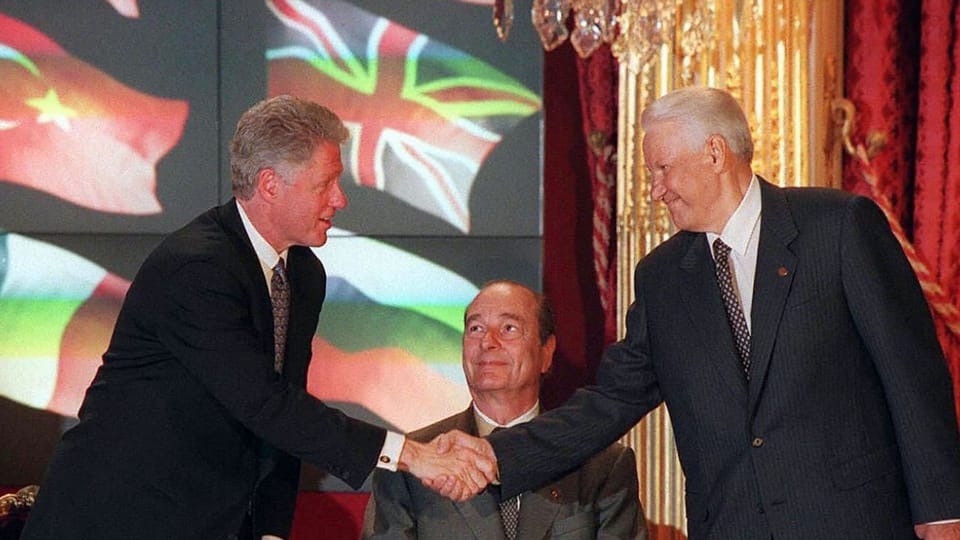We are shocked again that Putin is asking for the same thing again

Russia’s Deputy Foreign Minister recently stated that, in order to achieve peace, NATO must “withdraw” from the Baltic states. Many found this shocking—but the demand is not new.
As early as the 1990s, when it became clear that newly independent states from the former Warsaw Pact and the Soviet Union might join NATO, the Alliance sought to assuage Russian concerns by signing the NATO-Russia Founding Act in 1997. The document aimed to mitigate Russian objections to NATO’s enlargement.
One of its key political commitments was that NATO would refrain from deploying “substantial” permanent combat forces in the territory of new member states. In return, the Act reaffirmed core international principles, including respect for sovereignty, territorial integrity, and the UN Charter.
Russia has since repeatedly violated these very principles - most notably with its full-scale invasion of Ukraine in 2022.
Just prior to that invasion, Russia issued a list of demands to Ukraine and the West. Its central demand to NATO: a rollback to the Alliance’s 1997 borders - effectively requiring the withdrawal of NATO forces and infrastructure from all countries that joined after that year.
While NATO declared the Founding Act “dead” in political terms following the invasion, it never formally repudiated or denounced it. So de jure, the document still stands. And one could argue it remains de facto in force as well, since there are still no substantial (i.e., larger than brigade-level) permanent NATO deployments in Eastern Europe. U.S. forces in Poland remain on a rotational basis, and the forthcoming German brigade, even if permanently stationed in Lithuania, is still presented as a non-substantial force, within agreed limits.
Eastern flank members have repeatedly called for the Act to be formally declared null and void, arguing that it creates a two-tiered NATO in which where some countries are less defended than others. Their calls have met stiff resistance from certain allies, and the Act still remains.
Why is the dead agreement not being binned? Maybe because some Western policymakers still believe that maintaining the optics of restraint might help by avoiding escalation. The extension of the de-escalation doctrine seems to be that if NATO avoids provoking Russia, Moscow might be persuaded to limit its aggression to Ukraine and refrain from challenging NATO directly.
But Russia’s actions—and its own public declarations—show this conflict is not just about Ukraine. It is a broader imperial project aimed at resurrecting Russia’s sphere of influence and undermining the West. Moscow has said this explicitly and repeatedly - yet the West still acts surprised. And whenever the West gives ground - Russia just takes it and asks for more, calling it "justified grievances". And it will just continue like that until Russia is stopped.
During the Cold War, NATO stationed 400,000 troops along the border with the Warsaw Pact. Such numbers were considered essential to credible deterrence. Today, we cannot expect to deter Russia effectively while self-imposing limitations - especially when Moscow imposes none on itself.
The only viable strategy toward Russia is one of deterrence and defense—not appeasement based on obsolete agreements. Germany’s intelligence chief has again warned that Russia may soon test NATO’s resolve—with some little green men.
That warning must be followed not with business as usual or slow deliberation, but with fast and decisive action that strengthens deterrence—not five or ten years from now, but immediately.
The NATO - Russia Founding act was a naive idea to begin with. Keeping it on life-support now is a dangerous choice, allowing Russia to push the narrative that the West is violating all the agreements it signed, not Russia. Russia’s demand that NATO must return to its 1997 borders is implying that the West has in some way violated the agreement of 1997, which it has not.
And by allowing this agreement to continue existing de jure we are giving this narrative credibility and life.
The NATO - Russia Founding act should be declared null and void. NATO defence should have never been two-tier and Vilnius should be defended as defiantly as Berlin or London.
Have you said thank you once?
If you appreciated this article and you would like to support my work, join Friends of Democracy today!






Member discussion